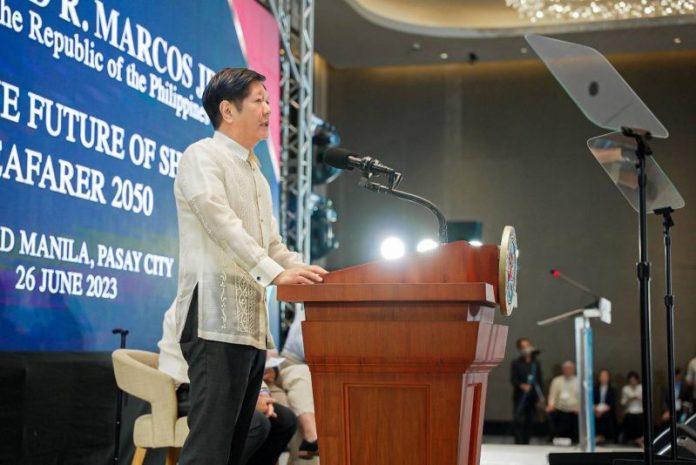
-
The shipping industry must adapt and integrate new developments into their fleets in order to keep up with “huge transformation” in the sector, according to President Ferdinand Marcos, Jr
-
Marcos noted the shift to new and sustainable fuels as well as the increasing deployment of digitalization and automation in the shipping industry
-
He cited the need for retooling of ships and building of more modern ships equipped with new technologies
-
Marcos reiterated a directive to the Maritime Industry Authority and the Commission on Higher Education to work closely with the shipping industry on the upskilling and reskilling of Filipino seafarers
-
This, he said, will prepare them for the shift of ocean-going vessels from using conventional fuel sources to green ammonia between 2030 to 2040
The shipping industry must adapt and integrate new developments into their fleets in order to keep up with “huge transformation” in the sector, according to President Ferdinand Marcos, Jr.
In a keynote speech during the Shaping the Future of Shipping-Seafarer 2050 Summit on June 26, Marcos said the industry is now “at a turning point”, citing the “huge transformation marked by the coming of new and sustainable fuels as well as the increasing deployment of digitalization and automation.”
To facilitate this shift, Marcos said ships must be retooled and newer and more modern ships with new technology built.
He noted that “another central part of this change necessarily includes investing in a highly qualified and well-trained workforce that will build, maintain, and man these shipping vessels and sail towards other opportunities.”
Marcos said this can be done by identifying the skills required for the new generation of ships, discussing education and training requirements, and committing to a fair and just transition to build a future-ready and resilient shipping industry.
He enjoined all government agencies and stakeholders to work together in identifying strategies to ensure the availability of skilled workers and fulfill the requirements of the shipping industry.
“With all hands on deck, we must come together to envision and shape the future of the industry and global trade for the next 25 years,” Marcos said
He promised to continue strengthening maritime-related policies and protecting seafarers and their loved ones.
He reiterated a directive to the Maritime Industry Authority and the Commission on Higher Education to work closely with the shipping industry on the upskilling and reskilling of Filipino seafarers to prepare them for the shift of ocean-going vessels from using conventional fuel sources to green ammonia between 2030 and 2040.
“This is expected to significantly increase by the year 2050. 2050 may sound distant for now, but in the language of the seas, it will arrive in almost a heartbeat,” Marcos said.
“Thus, it is vital that we now embark on a long-term, tangible, and sustainable effort that will address the many demands of the maritime sector in the years to come.”
RELATED READ: EC extends recognition of PH seafarers’ certificate




